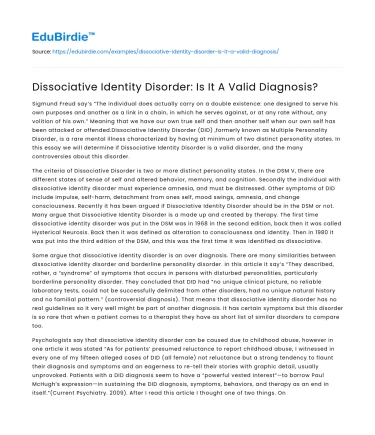Sigmund Freud say’s “The individual does actually carry on a double existence: one designed to serve his own purposes and another as a link in a chain, in which he serves against, or at any rate without, any volition of his own.” Meaning that we have our own true self and then another self when our own self has been attacked or offended.Dissociative Identity Disorder (DID) ,formerly known as Multiple Personality Disorder, is a rare mental illness characterized by having at minimum of two distinct personality states. In this essay we will determine if Dissociative Identity Disorder is a valid disorder, and the many controversies about this disorder.
The criteria of Dissociative Disorder is two or more distinct personality states. In the DSM V, there are different states of sense of self and altered behavior, memory, and cognition. Secondly the individual with dissociative identity disorder must experience amnesia, and must be distressed. Other symptoms of DID include impulse, self-harm, detachment from ones self, mood swings, amnesia, and change consciousness. Recently it has been argued if Dissociative Identity Disorder should be in the DSM or not. Many argue that Dissociative Identity Disorder is a made up and created by therapy. The first time dissociative identity disorder was put in the DSM was in 1968 in the second edition, back then it was called Hysterical Neurosis. Back then it was defined as alteration to consciousness and identity. Then in 1980 it was put into the third edition of the DSM, and this was the first time it was identified as dissociative.
Save your time!
We can take care of your essay
- Proper editing and formatting
- Free revision, title page, and bibliography
- Flexible prices and money-back guarantee
Some argue that dissociative identity disorder is an over diagnosis. There are many similarities between dissociative identity disorder and borderline personality disorder. In this article it say’s “They described, rather, a “syndrome” of symptoms that occurs in persons with disturbed personalities, particularly borderline personality disorder. They concluded that DID had “no unique clinical picture, no reliable laboratory tests, could not be successfully delimited from other disorders, had no unique natural history and no familial pattern.” (controversial diagnosis). That means that dissociative identity disorder has no real guidelines so it very well might be part of another diagnosis. It has certain symptoms but this disorder is so rare that when a patient comes to a therapist they have as short list of similar disorders to compare too.
Psychologists say that dissociative identity disorder can be caused due to childhood abuse, however in one article it was stated “As for patients’ presumed reluctance to report childhood abuse, I witnessed in every one of my fifteen alleged cases of DID (all female) not reluctance but a strong tendency to flaunt their diagnosis and symptoms and an eagerness to re-tell their stories with graphic detail, usually unprovoked. Patients with a DID diagnosis seem to have a “powerful vested interest”—to borrow Paul McHugh’s expression—in sustaining the DID diagnosis, symptoms, behaviors, and therapy as an end in itself.”(Current Psychiatry. 2009). After I read this article I thought one of two things. One, maybe that if there are repressed memories it can be induced by a pushy therapist. Basically a therapist could put the patient under such pressure that the patient mind makes up stories. Second, I thought maybe having the several personalities is a coping mechanism that they can tell what truly happened with such confidence because they are speaking of the truth as “another person”.
A major ethical consideration that relates to this topic is Principle D: Justice. This principle makes psychologists and therapists recognize justice for all people and for them to exercise reasonable judgement and precautions to ensure the potential bias. This principle relates to this topic because to be a therapist of someone with dissociative identity disorder you must be tentative. The side opposing dissociative identity disorder is failing to meet this ethical code because they are attacking the disorder itself, trying to make it “invalid”. In one article it discusses how in trial you can be found “not guilty” if you were insane while breaking the law. “persons with DID cannot be responsible for their actions if the usual features of the condition are present. A person with DID is a single person in the grip of a very serious mental disorder. By focusing on the features of DID which have, as we argue, the effect of deluding the patient, we try to show that such a person is unable to fulfill the ordinary conditions of responsible agency”(identity, control, and responsibility). This is a perfect example of Principle D: justice. If the patient does not have reasonable judgment they can’t take precautions.
I believe that Dissociative Identity Disorder is a valid disorder. There isn’t much evidence but it would definitely be hard for people to fake such an illness that’s as complex as this one. Dissociative Identity Disorder is an extremely rare disorder. The average number of alternate personalities a person with DID has between two and thirteen. There is no way someone can fake that many without slipping up. Dissociative Identity Disorder has been apart of the DSM since 1980. As the understanding of the disorder develops more questions come up against it, however there are no questions against if the symptoms or experiences are real.






 Stuck on your essay?
Stuck on your essay?

